Do I go left or right?
I don’t see any red and white trail marks to my right. Going right means going up another steep part. I have been climbing up steep parts for what seems like hours, but has translated to only a few measly kilometers.
Which way do I go this time?
It’s day one of my version of Turkey’s Lycian Way hike, and I’ve already lost my way a few hours ago when I did my first river crossing near Göynük Canyon.
If I had stayed right after the information booth/trailhead and did the easy “tourist” route to the canyon viewpoint and picked up the “Gönyük Yaylasi” trail further on, I would have avoided getting my feet wet. But, I chose the adventurous left route also heading towards “Gönyük Yaylasi,” the cooler highland hamlet away from the main seaside town and beach resorts. I ended up in overgrowth, wishing for a machete, and had to backtrack to find the trail markings after I slipped on rocks and baptized my feet in a cold rush of river water.
Since then, I’m going up, up and up and up. I haven’t done much exercise during our long winter break, and the burn in my legs comes quick under the 22-ish kilogram weight of my backpack. My walking sticks are my best friends, and help me pull me forward.
I chose this freedom, and take frequent rest breaks to listen to the birds, smell the pine trees and look at the mountains protecting me. I stop so I can breathe. I have to stop, too, because I can’t breathe, and every step reminds me how naïve I am.

Then, I reach this crossroad. I’m not good at following a set, predetermined path, but I also get discouraged when I’m on a marked path and can’t find the markings. I want guidance in finding my own way. I want a sign, a splash of paint, a pyramid of rocks.
I look at my paper map, which is good but doesn’t drill down to the detail I need. I resist turning on my phone’s GPS and draining my battery. I don’t know when I will be able to plug in again.
I go left because I find a series of red and white trail markings on the big rocks.
Down below, I see the group of Russians who camped at the trailhead last night. Over yesterday’s campfire, they asked me if I wanted to join them on the hike, but I declined. I romantically (arrogantly) wanted to go at it alone, at my own pace. Besides, they looked like a group of professional hikers and I knew I couldn’t keep up with them, and didn’t want to slow them down on their nine-day trekking holiday. I told them I wanted to start early, like at 7:30, a time when many Lycian hikers are still sleeping or just getting out of their tents, and see how far I can get before it gets too hot.
As they zig-zag upwards, I give them a cheerful hello, masking my disappointment. I left two hours before them, and here they are. I foolhardily believe I am ready for this kind of rugged trail, and keep hoping that my mountain legs will show up soon.
“Are you going back to Göynük?” Elena shouts up.
“No. I’m going to Gönyük Yaylasi. The path is marked this way,” I say.
“No, you have to keep going up, and up. Our guide says there is a loop here, and that way goes back to the city. Meet us at the fork,” Elena replies.
I’m at once deflated and relieved. I chose wrong, but at least I can be pointed back the right way.
Elena, Vadik, Daria, Kirill and Nadia come to same crossroad, and without a doubt go right.
They again invite me to walk together. This time, I’m humbled enough to accept their invitation. They know more than I do about hiking, and I can learn from them. I may have walked some 10,000 kilometers on roads, but I’m out of my element here. Walking nature’s way is far different than walking the auto way.
We go up and up and up and up. They blaze ahead and I slowly follow their footsteps.
Eventually, we peak and start going down and down and down. I suck at uphills but I am even worse on the downhills. I have a fear of losing my footing and being paralyzed. And this freaking backpack shifts my center of gravity, making it harder to figure out where my equilibrium, if I ever had any, is.
My new friends are patient and kind. They encourage me to go slow, and don’t seem to mind waiting for me. We stop for water at the only water source we have passed since the river early this morning.

Another group of Russians, who will be known for the next few days as the Saint Petersburg Group, pass us. I say hi to Polina, Masha and Liza, young women I hung out with for a while the day before visiting the off-trail canyon section. They left even later and are passing us. Sigh.
I take a long sip of water, and sit on a fallen tree. I’m not sure exactly how I fit in. I don’t want to be part of a group, but I will struggle more alone. They paid their guide Vadim (whose nickname is Vadik) to be here, and I don’t want to get in the way of their hard-earned hiking vacation. I’m not sure I can afford a guide, but my first morning out proved my inexperience on rugged trails may cost me more than money.

I guess I will see where all this will take me, and a tune back into the Russian conversation around me. I use the little Croatian I know and the Russian I picked up in Central Asia to catch bits and pieces of their chat.
Elena is our bridge. She’s cool, and I like her immediately. She is fit and feminine. She has hot pink manicured nails, turquoise with glitter toes, and a few glued-on pink eyelashes, but in her eyes, I see a fire of strength, compassion and easy-goingness. She’s a great mix of a woman – funny and kind, caring and tough. She translates our lives back and forth between Russian and English.
Late afternoon finds us in a campsite near the river. I set up my hammock, the first time I will sleep dangling over the ground. Since I’m thinking of this phase of the walk as thru-hike, I brought a shelter system that can work as a hammock or a small bivy, giving me greater flexibility on where and how I sleep at night. A 3×3 meter tarp adds an extra layer of protection from rain and wind.
Vadik, a ski instructor, mountain guide and alpinist, nods with approval. He makes me feel better about myself. If I don’t fall out of my hammock tonight, I will feel even better, I think, re-checking my suspension system.
After a refreshing dip in the river, Vadik’s assistant Daria, who I think of as a petite and powerful Wonder Woman for the weight she carries (which is as much or more than my backpack weight), begins setting up dinner. She pulls out a can of tinned meat, powdered potato packs and plastic bottles of ketchup and mayonnaise. There’s tea (always time for tea), and bowls, pots, cups, silverware. “Wow! Lluís should see how other people camp,” I think to myself, wondering again what is wrong with my gear strategy.
I offer my small pack of quinoa. The trail guidebook says there are food options at least every two days, so I packed small portions of food with that in mind. After today’s slow pace, I am sure I miscalculated how quickly I will reach the next town and my rations.
Daria says no as she lights up the gas stove, and Elena explains, “We have lots of food. We eat our food today, and tomorrow we have your quinoa.”
I nod, again accepting their kindness.
Vadik comes over with a recycled plastic bottle filled with wine and a chunk of Turkish cheese. I laugh.
“You have wine?!? How do carry wine? What the hell am I doing wrong with my pack??” I’m in disbelief.
“Yes, the French way, vino i sir,” Vadik says part in English and part in Russian. Wine and cheese. “Tourist style.”
Kirill is the fire starter. He hums and dances a little dance as he adds kindling to the pit. I watch, looking for tips to help with my own fire-making skills.
Again, I’m not sure where I fit in and don’t want to assume I should stay part of a guided tour. I decide money shouldn’t be an issue if I am buying a safer route, and I offer to pay my share to join the group. After a few definitive “no, no money” head-shaking and hand-waving from everyone, Elena says, “You know the Santiago Camino? People help each other. Now we help you. It’s ok. No problem.”
I say, “Ok, I’ll come with you these few days, but only if I can buy the wine in Çirali (the city where we will go our separate ways).” It feels like I am getting the better end of the deal, but everyone seems happy.
Vadik, a man who obviously enjoys being outside in nature, takes his place on the rocks near the fire. He becomes the group’s poet once the wine is poured and cheese is sliced. Camping in nature with the last birds tweeting before it goes dark brings out Vadik’s caring, sentimental side. He raises his glass and there is a softness in his eyes that I understand without understanding the words he says in Russian. “He’s toasting to friendship – between us and between all countries,” Elena tells me.
We clink plastic and metal cups, and I take my place with them around the campfire.
I have a hard time sleeping. Even though the others are a few feet away, I’m feeling lonely without Lluis. I listen to the frogs and distant owl to keep the depression that comes now and again and darkens my thoughts. I don’t have enough insulation and my lower back gets cold in the hammock. I am anxious, and worried if I will be able to keep up with my new friends.
Soon after first light, I quickly pack up my gear. Lluís and I tend to wild camp off roads where we prefer not to be seen. We get up in the dark and are back on the road before sunrise. We eat breakfast later on, distancing ourselves from the places we sleep.
Hikers on holiday have a different rhythm. They boil water for oatmeal and coffee and tea (there’s always tea on this side of the continental divide). They flip their tents on their sides to dry the night’s humidity. They eventually repack everything and slowly get started. I watch their leisurely morning routine in awe. Lluís will hate when I say, “We suck at camping. I like the Russian way better.”
Vadik noted last night that today will be a tough hike, at least 7 to 9 hours of more steep up and downs. As they pack their sleeping bags, I ask my body to be good to me today. “Please let’s not slow them down too much.”
Nadia packs up first. She’s a tall woman with a sense of presence, but quiet and reserved in her manner. She’s the scout of the group, the one willing to go ahead, find the route and whistle back directional guidance. Everything about her says she is outdoors person, from her hat to her durable ankle-high boots. I’ll find out later that she has done all sorts of hikes, including a strenuous, self-sufficiency hike in Kyrgyzstan with a small group of people that required carrying three weeks worth of food and some equal amount of water.
Vadik tells me to go out with Nadia and they’ll meet us across the river. I pick up my pack and daypack, and set out with a fleeting moment of dread. If the river is high, I’ll be wading through it, slipping most of the way. If it’s not high, I will have to jump rocks, and probably miss a few. Neither option is a good one to me, but it’s the only option if I want to go ahead.
Nadia’s outdoor finesse shows on the first of three river crossings. Her long legs easily make the next rock. She tells me in Russian and shows me with gestures, to hold the end of her walking poles while I get across. “Spasiba, Spasiba,” I say. “Thank you.” I’ll be repeating this phrase for hours.
The next crossing requires bouldering. She takes my daypack, which is a really bad idea on a hike like this because it always getting in the way. She comes back for my backpack and hoists it to the dry spot while I squirrel up the big rocks.
At the third crossing she helps me again, patiently pointing out which rocks are steady enough to step on.
The three others join us in a few minutes, and our upward journey starts again.
The Saint Petersburg group catches us a bit later, and we’ll merge and separate a few more times along the way. As much as I don’t like group travel, I remember that I asked the universe to keep Lluís and me safe, and today my safety comes in numbers.
My legs, however, don’t seem to care that I made a deal to walk steadily onwards. The pain is far more intense than any post-marathon muscle soreness I have ever experienced. The change in elevation will be about 2,500 feet (770 meters) from the river area we slept at to the tiny village somewhere higher up. We had a similar up and down yesterday, and, mentally, I can’t convince my body to meet the challenge. It’s too much too soon.
Reality sets in. I won’t be able to stay with the group for the next few days and keep climbing towards the snow-covered peak of Mt. Tahtali, which stands at 2,366 meters (about 7,760 feet) above sea level and is one of the star peaks in this part of the Taurus Mountains.
I admit defeat to my new friends. I tell them I will stay the night at the guesthouse at the village, and the next day I will walk myself down to lower land. Today’s hike is long, and my very slow pace will make it longer for them. They still have a few more hours of tough walking before they reach their campsite in another village.
They see how tired I am, and while they say encouraging things, they respect my decision. One of the important rules of hiking is that it’s not a competition and everyone has to do their own hike.
But, they don’t give up on me. A few kilometers from the village, Göynük Yaylasi, they divide up some of my weight and add it to their own packs. Vadik insists that I should stop carrying a daypack and, and using carabiners, invents a way to temporarily hang it off the back of my big backpack. “This has to go inside,” he explains, handing Kirill my electronics sack and finding a spot in his own backpack for my extra water bottle.
Elena, Daria and Nadia add a few things to their packs. My tent goes somewhere, my tarp somewhere else. Daria and Vadik are the only people I’ll meet on the Lycian Way carrying the high side of 20+ kilos. Everyone else has far less than 15 kilos, with the much wiser average being about between 8-12 kilos; but even those on the light side will tell me at some points in the trail, 10 kilos also feels too heavy as they make their way over the constantly present rocks that define the Lycian Way.
I curse the stuff I carry and wish I left more stuff behind at the Cultural Routes Society’s office in Antalya. But, I keep reminding myself that I am on an 8-month, three-season walk and can justify every item I haul. Still, I feel like an idiot, and embarrassed that I need five other people to get me through this section.
Elena’s quick to cheer me up.
“We are Russian. We don’t leave our people behind.” Her eyes twinkle when she smiles.
At the village’s only panysion (guesthouse), we eat scrambled eggs with tmatoes (menemen), soup and order a few beers. I insist on paying. The only way I can say thank you is to send my angels off with full bellies.
We agree to meet a few days later at the seaside town of Çirali.
“I’ll bring the vino i sir… French tourist style,” I say hugging them, promising them wine and cheese. I wave as they put on their backpacks and think about the hot shower I’ll have in a few minutes.
The next day, after a proper Turkish breakfast (the Turkish love breakfast as much as I do), complete with tomatoes, cucumbers, olives, cheese, a two-egg omelette, bread, butter, honey, jam, and, yes, tea, I set off to find a way towards Gedelme, where I think I will be able to catch a ride towards the bigger city of Kemer.
My legs hurt less as I find my way onto a wide beautiful trail. Woodpeckers knock on trees as I follow the waymarkings down and down.
I cross a few landslide areas, and it dawns on me that I am not going to Gedelme. I’m on a different trail going towards the old Roman Bridge. I pull out the guidebook and reread a section I had skimmed a few days earlier. Ugh! I missed the junction to Gedelme. I’m too far in to go back, and after examining the print map and crossing-checking it with GPS, I think I’m on a good route towards Kemer. I keep going.
The sky above me is dark for hours, and I hear thunder around where I think Mt. Tahtali should be. I put on my rain poncho when the drizzle turns into light rain. I blow a kiss towards the mountain, and send good wishes to my friends and the St. Petersburg’s group, knowing that they may be getting wet as they climb higher.
There are several more landslide areas, but two cause me slight panic attacks. One left behind a very narrow gravel path, and a misstep will cause a fast slide down the slope. I lean into the hillside and sidestep across. “Small step. Quick step. Look at where you are going. You’re going ahead, not down. Quick step. Small step,” I whisper to myself, refusing to think too much.
Thinking too much comes a while later. The entire path is gone, and the drainage pipe that once had the cement path on top of it is crumbled in pieces down the steep slope. There is a little creek to cross, but the landslide has made the terrain precarious. I don’t see the way across, and neither the upside or the downside has clear walking options. At some point, I’m thinking about roping up my backpack (on Vadik’s advice, my daypack is repacked inside my big pack), rolling it slowly down the landslide remains, and figuring out how I can rope myself to a tree and pull my backpack up. I take a third, fourth and fifth look at the rocks, and suddenly I see a path connecting the two sides that I didn’t see before. It’s worth a shot, and surprisingly, turns out to be easier than I expected. I congratulate my inner wisdom.
I keep walking along a river and end up in a guesthouse in the very touristic town of Kemer. Most of the signs there are in Russian, not Turkish, a sign of who vacations in Turkey’s warm south coast. I buy bread and cheese, and raise a cup of herbal tea to my friends on the mountain.
The next morning, I walk the low coastal route to the ruins of ancient Phaselis. It’s easy walking with just a couple liters of water and some snacks. I’ll take a minibus back and have a room again tonight. But, very often during the day, I see clouds hugging the mountain. I’m glad I am not there. There will be snow that high, and I couldn’t hike in snow. I hope my angels have warm layers.

I pack up again and take another bus towards Çirali. The bus stops on the main road, about 7 kilometers from the town. I look at my map again and see that the Lycian Way reconnects on this side of the road not far from Ulupinar and goes on to the legendary site of the Chimera’s continually-burning natural fires.
I step down onto what looks like the trail and end up in mud to my ankle. I fall down like a tree, sideways, my chest strap nearly choking me. I have to fish out my shoe with my hands and walking stick. “Damn it! What am I doing??”

My GPS wasn’t synced to the right spot. The real trail was a couple hundred meters up. I stop in the restaurant which houses a trout farm to clean my shoes with the hose in the Turkish-style ground toilet. I decide I deserve a fish lunch and salad before conquering the rest of the day.
I set off again and come to another river. This time, I don’t mind crossing. I need my shoes wet so the last of the mud drips off. Drying out my shoes, I hear voices coming down the hill I passed a few minutes ago.
It’s them, my five friends! I’m so excited to see them, and can’t wait to hug them.
“It was so good that you didn’t come with us,” Elena says. “It was a hard trail, and there was snow to our ankles. It was very cold the last couple of nights.” I’m glad I knew my limits, and I’m glad this group and St. Petersburg group are safely back down on the low route.
Vadik starts pulling out plastic bottles and asks me how much water can I fill. There is no other water source ahead, a common problem on this trail, and we’ll need a lot of water for camp tonight. I pull out my 2-liter Camelback, foldable half liter bottle and my two other liter bottles, happy that, finally, my gear is useful.
We camp below the Chimera fires, where Greek mythology tells of a fire-breathing monster with the head of lion, body of a goat and tail of serpent that was slain by Bellerophon, who was mounted on the winged-horse Pegasus. The she-monster is said to be buried in the earth, spewing out unquenchable fires from holes not far from our campsite.
During our chat about everything, I bring up yoga and say I have a travel yoga mat with me. Daria and Elena are excited, and say we can do yoga before dinner. I grab my phone and open my Gaia app, where I have downloaded a few short yoga workouts. We do 15-minutes of fabulous hip-stretching, while Nadya, Kirill and Vadik cheer us on.

It’s Elena’s 30th birthday, and Kirill gets the party going with Russian pop music playing on his portable MP3 player and speaker. I’m in shock that they can pack a speaker! We dance a bit while we wait for the quinoa and tinned meat to cook.
After dinner, we climb up to sit near the Chimera fires. Çirali’s lights twinkle below as the blue sea fades into darkness.
Vadik’s voice softens as he pours the wine. Tonight he toasts Elena, and her wise decision to start her new decade in this special place. Another small group of Russians are also camping nearby, and my friends talk to them for a while.
I look into the dark night and thank my lucky stars for whatever happened to bring me to this moment.

The next morning, after coffee and tea, we start down to Çirali. There is steep part with slippery rocks that I struggle on. Kirill put his backpack down, and comes back to take mine.
“No, no, no. No!” I try to stop Kirill. I should be able to do this.
“The rocks are slippery. Give me your bag. You go without the bag,” Kirill insists.
Even without the weight, I feel my feet lose their grip. I so suck at this kind of walking, but I am determined to keep trying.
At the flatter section a few meters down, I give Kirill a huge bear hug. I love these people, and I am so thankful to be with them.
We set up camp at an official camping site with running water, hot showers and toilets. We walk down the beach, where in the summer baby Caretta Caretta turtles will hatch and race for the sea, and visit the ruins of Olympus, another important Lycian city from back in the day
On the way back, I buy beer and wine and cheese and some other camp staples, like cookies. When angels show up, I have learned, they may want a glass of wine, some cheese and something sweet.
The next morning, Polina, one of the women in the St. Petersburg group who is also camping at our campsite, tells me there is an older couple in town who are willing to offer a free room in their pension in exchange for a few hours of work in their orange grove. I’m game for that, and we go talk to the woman about me staying there for a few days.
When I come back, my friends are getting ready for their lives day’s hike up the coast to Tekirova.
Before they go, Vadik wants to teach me something else. We take everything out of my backpack, and rearrange its contents so that the heaviest things are on the bottom. Road walking for 10 hours a day means I distribute my stuff differently so that it both super easy to access and the weight is more on my mid and lower back, taking some pressure off my hips.
I try it on, and my pack feels different. If that doesn’t work, he tells me the Russians have another way to fit everything in their packs. He takes his backpack puts something in the bottom, and then puts his foot inside while stretching it up with his hands. It’s the universal sign language for cramming things into a backpack.
It hurts to watch them pack. Goodbyes are inevitable, but I never get used to them.
I give them each a long hug, and walk off to pick oranges.
I look back at the gate. I asked the universe to watch over me, and these dear people walked into my life. Under their care, I found new wings.
I bend my head in their direction. I hope angels walk into their lives and watch over them.









Lovely story. Glad you are okay. Funny. I always think of you as the tough one. It’s all relative, I guess. Happy walking in this new way.
Hi Jackie,
Thanks for thinking of me as tough. Sometimes I feel fragile. I guess toughness and fragility are opposite sides of the same coin…one quality keeps the other one in check.